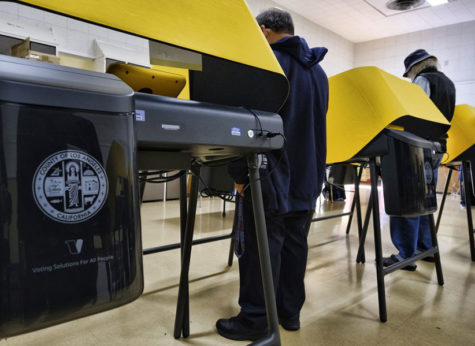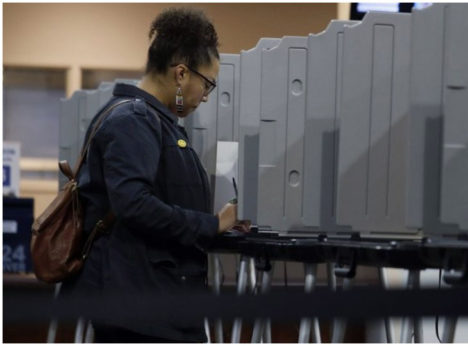
The biggest day in the Democratic primary is here: Super Tuesday. There will be over 1,300 delegates up for grabs across 14 states. The remaining Democratic presidential candidates are hoping to grab at least one-third of these delegates, as it would give any one of them a lead that will be impossible to overcome before the party convention this summer in Milwaukee.
Currently, Bernie Sanders is the frontrunner with 60 delegates, while former Vice President Joe Biden is holding a not-so-distant second place of 54 delegates after gaining a major win in South Carolina on the weekend. Elizabeth Warren currently sits in third with eight delegates, while multi-billionaire Mike Bloomberg and Tulsi Gabbard are still running, despite having no delegates currently.
Major shakeups and shifts have occurred since the South Carolina primary, and most of the candidates who had been competing for the “moderate” or “centrist” vote are now coalescing around Biden in hopes of denying the left-wing Sanders the nomination. Billionaire candidate Tom Steyer dropped out of the race Saturday night, following his third-place finish. Pete Buttigieg ended his campaign Sunday night, with Minnesota Sen. Amy Klobuchar doing the same on Super Tuesday eve. Both Klobuchar and Buttigieg have since endorsed Biden for the party’s nomination. Popular Texas Rep. Beto O’Rourke, who withdrew his own bid for the nomination very early in the race, also came out in support of Biden at a Dallas rally on Monday evening.
What is the terrain of Super Tuesday, and what factors are at play that will help determine who has the clearer path to the Democratic party nomination?
The States
Fourteen states and one territory are participating in Super Tuesday. California holds the lion’s share of delegates, at 415 (31%). The southern state of Texas has the next largest chunk of delegates, with 228, followed by North Carolina (110), Virginia (99), and Massachusetts (91). Nearly half of the overall delegates available today will come from southern states.

This is the first time California will participate in Super Tuesday since former Gov. Jerry Brown signed a bill moving the state’s primary to March 2020. In the past, primary candidates have largely skipped campaigning in the state since it didn’t vote until June, considered late in the game for determining who will be the nominee. Now, the state stands in a prime position to give any candidate that does well there a major boost.
California has over 19 million registered voters, more than any other state in the nation. Its community of voters is also a diverse one, sharing a strong demographic profile with next-door Nevada. Latinos will make up close to 30% of California primary voters; Asian-Americans, 15%; and Black voters a little over 6%. Sanders won in Nevada, and recent polls show him to be the frontrunner in California as well.
Biden’s South Carolina victory could bode well for him in the southern states participating in Super Tuesday. North Carolina, Tennessee, Virginia, Alabama, and Arkansas all have sizable Black populations. Biden won 63% of the Black vote in South Carolina, which could translate into similar numbers in the other southern states with significant Black populations as well.
Texas is a southern state where the Latino population is larger than the Black population. This makes the state a testament to the large and growing Latino bloc of voters that candidates need to take into consideration. Texas has typically voted Republican in presidential elections (President Donald Trump won the state by 9% in 2016) but there is hope for Democrats after flipping several congressional districts and coming just short of winning a U.S. Senate race in the 2018 midterm elections.
A recent poll for Texas showed Sanders leading among Latinos with 46%, while Biden holds the edge over Sanders among Black voters by 30%. Sanders is popular among voters under 45, while Biden is popular among voters 46 and older. The current lead that Sanders has in polls in Texas stands in sharp contrast to his performance in 2016 against former Secretary of State Hillary Clinton when he lost by 30 points.
The Issues
A lot of math and number-crunching will be going on during and well after Super Tuesday (California’s audit requirements will make for slow vote counting, likely meaning final results will not be certified until up to a month after the primary), but it is also important to know what issues are dominating the minds of voters.
In a number of recent polls, health care has topped the list of issues that voters consider important going into the 2020 elections. During the 2018 midterms, health care debates dealt with protecting the Affordable Care Act after GOP and Trump attempts to repeal it. Now, presidential candidates are focusing more on the question of overhauling the entire health care system.
“Medicare for All” remains the issue most starkly dividing the candidates. Sanders has led the charge to extend a single-payer health care system like Medicare to all Americans. His proposal promises to improve care and cut costs while vastly scaling back the power of the private insurance industry and pharmaceutical companies. Warren also embraces “Medicare for All,” though has some differences with Sanders over the pace of transition. Their positions have made both targets of private health care and hospital lobbyists. The rapidly expanding coronavirus crisis and the Trump administration’s scattered response has heightened attention to health care issues.
Biden takes what the media often describes as a more “moderate” approach to reform, saying he wants to expand on the Obama-era Affordable Care Act. He wants to add a “public option” to the existing private health system, a from progressives during the 2009-10 ACA debate which was sunk by conservative Senate Democrats at the time.
Billionaire Bloomberg has claimed Medicare for All would bankrupt the country and initially offered few suggestions on what changes, if any, he would make to the private system. He’s now gone on record saying he too wants to expand ACA. Critics have been quick to point out, however, that the former Republican panned the ACA as a “disgrace” when it was originally passed.
Despite the major improvements in coverage that came with the ACA, millions of families have been bankrupted by medical bills in the years following its passage and others struggle to afford insurance premiums. More than 27 million Americans still have no health coverage at all. Voters will certainly carry these worries with them to the ballot box on Super Tuesday.
They’ll also be concerned with another important issue: the fate of a world endangered by climate change. In California, when the Los Angeles Times asked voters to pick the number one priority for the next president, nearly half chose climate change. In the last 20 years, California has experienced some of its deadliest wildfires on record. Climate change is an issue not only important to California voters but the world over.
Sanders has adopted the Green New Deal, which is co-sponsored in the House by Rep. Alexandria Ocasio-Cortez of New York and has perhaps the most comprehensive plan to combat climate change. Sanders takes an aggressive line against the fossil fuel industry and pushes for criminal prosecution of greenhouse gas emitters like ExxonMobil.

Warren hasn’t issued a standalone climate change plan but has incorporated parts of one into her proposals for the military, public lands, trade, U.S. manufacturing, and climate risk disclosure. Her stance is that corruption is what has kept the U.S. from acting on climate change.
Biden helped to introduce the first climate change bill in the Senate back in 1986. The former VP has also embraced the Green New Deal while pledging in his platform that the United States will achieve net-zero emissions of greenhouse gases by the year 2050.
Bloomberg has a history of involvement in climate change issues, having served as a United Nations climate envoy, but he criticizes the Green New Deal as being hopeless under a Republican-controlled U.S. Senate.
Income inequality and a widening wealth gap also remain a concern for working-class voters especially, and Sanders and Warren have made calls for higher taxes on the wealthy and Wall Street. Sanders noted on his official Twitter account that, “the fairest way to reduce wealth inequality, invest in the disappearing middle class, and preserve our democracy is to enact a progressive estate tax on the inherited wealth of multi-millionaires and billionaires.” Warren has proposed a number of policies including an Ultra-Millionaire Tax that could generate $2.75 trillion in revenue over a ten-year period. The proposal has earned her major attacks from big banks and their representatives since she made it last year.
Biden doesn’t seem to have any plans of higher taxes for the wealthy, having stated at a fundraiser last year that “Nobody has to be punished. No one’s standard of living will change.” He contends that U.S. capitalism “doesn’t require some fundamental shift.”
In a recent appeal to Black voters, Bloomberg proposed a plan to combat racial economic inequality that would include a $70 billion investment in the nation’s most disadvantaged neighborhoods. This proposal, of course, stands in sharp contrast to a statement he made in 2018 that taking money away from the rich and giving it to the poor was a bigger problem than income inequality.
These are just a few of the key issues that have dominated the Democratic primary race to date and which will play a prominent role in how voters cast their ballots today and in the races still to come. As we saw in the 2018 midterms, voters were focused on the issues and giving a resounding rebuke to the current occupant of the White House. The candidates competing for the Democratic nomination are in a race to see who will run against the racist and far right-wing Donald Trump this fall. Super Tuesday will give a clearer indication as to who they believe has what it takes to follow through on what the midterms started.










